-
CLOSE ENEMIES/FRÈRES ENNEMIS (David Oelhoffen 2018)
DAVID OELHOFFEN: CLOSE ENEMIES/FRÈRES ENNEMIS (2018)
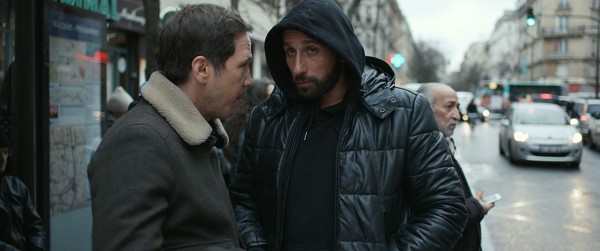
REDA KATEB AND MATTHIAS SCHOENAERTS IN CLOSE ENEMIES
Deeper ties
In contrast to the admirable but relentlessly unfun La camarista, it was tempting to say of this film that it's far too much fun to be in a festival. But seriously, its inclusion by SFFILM is justified by its superior quality. Even though this French polar (crime thriller) classifies superficially as a conventional police-drug actioner, there is excellence in every aspect. The whole package, writing, directing, image, pared-down score, is sleek and functional. The acting is fine starting with the leads, Matthias Schoenaerts and Reda Kateb. This is not stylistic greatness; another Jean-Pierre Melville hasn't come along. But enjoyment is justified by quality.
The theme is of two men who grew up in the same rough Paris cité but went to other sides, Manuel (Schoenaerts) into drug trafficking and Driss (Kateb) to detection and prevention of same, having just been promoted to stupe (the police narcotics division). We're not hit over the head, but the action starts off early and, above all, the sense of togetherness of the drug dealing clan, who first appear joyously greeting one of their number just released from prison, and a dad plays football with his tousle-haired kid, the only male in sight not wearing the look du jour, crewcut and tight leather jacket.
Barely more than twenty minutes into the film comes a sudden violent attack on Manuel and two of his associates in the back of a car. Manuel escapes, fairly shaken, but his two comrades, including Imrane Mogalia (Adel Bencherif), a man who was a mole for the cops, are taken out, as is the drug shipment. This crisis bonds Manuel and Driss once more, because it is a giant blow for both. The assailants are so far unknown as we follow the two men home where their loved ones sense they're shaken. More disturbing is the scene where Driss goes to tell his informant's wife that he's gone, so well done it gave me a catch in the throat.
The traumatic disruption obliges Driss to force Manuel to cooperate, but that leads Driss to feelings, perhaps, of betrayal. When he revisits his parents, he who has denied earlier to someone that he even knows Arabic, speaks to them in Arabic, recalling that the wallpaper he and his father put up together. He always found it ugly, he says. And then he switches to French, "Maintenant il me manque," "Now I miss it," the shift signaling his split personality and life. They do not even know where he lives now. A deft, heartfelt scene.
Close Enemies is an exploration of a classic dramatic theme: the way deeper ties emerge when individuals who have made their way into a certain profession or world are brought to the brink. We see at the outset how Manuel has been made an honorary member of an Arab drug clan, but after he almost dies and two of his closest frères, his affective brothers, have been wiped out on either side of him he is symbolically isolated, and as he flees what he thinks is certain death thereafter, he remains increasingly hidden and withdrawn inside his dark hoodie. Driss' own parents, still living in the poor banlieue, think him a danger to themselves now that he is with the police and elevated to the department whose aim is to fight the people he formerly was associated with. His role is ambiguous, conflicted. His female police superior thinks him a danger, and his old comrades think him a traitor, even as they may admire the mainstream success he has come into, however dubiously.
All this, in a French polar, constitutes satisfying and complex character development. It's been pointed out, though, that the two leads' families aren't much developed. And for all its excellence, I can't claim that Close Enemies transcends its conventional genre, because that's not what writer/director David Oelhoffen and co-writer, Jeanne Aptekman have set out to do. (see Boyd van Hoeij's admiring and eloquent review in Hollywood Reporter.) David Oelhoffen previously directed Viggo Mortensen in the 2014 Camus adaptation Far from Men/Loin des hommes.
Close Enemies/Frères ennemis, 111 mins., debuted at Venice Sept. 2018 and played at over half a dozen other festivals, including Busan, Warsaw, Göteborg, Cleveland, and the San Francisco Film Festival, where it was screened for this review.
SFFILM showtimes:
Sun, Apr 21 at 4:30 pm
Victoria Theatre
Mon, Apr 22 at 6:00 pm
Victoria Theatre
Last edited by Chris Knipp; 04-12-2019 at 10:43 AM.
-
A FAITHFUL MAN/L'HOMME FIDEL (Louis Garrel 2018)
LOUIS GARREL A FAITHFUL MAN/L' HOMME FIDÈLE (2018)
(Review originally written for the 2018 New York Film Festival.)
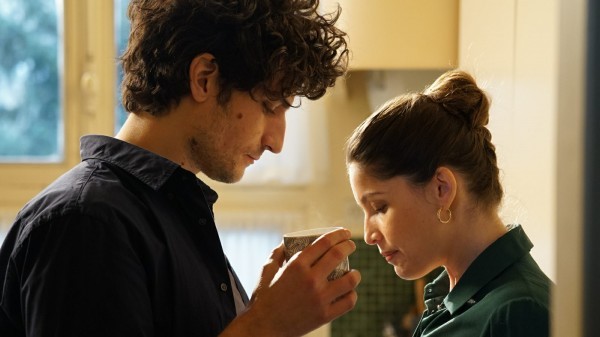
LOUIS GARREL AND LAETITIA CASTA IN L'HOMME FIDÈLE
Love and death: a quadrangle with a wise child
Louis Garrel's second film as director, co-scripted by the legendary Jean-Claude Carrière, is about a man (played by Garrel) whose girlfriend Marianne (Laetitia Casta) marries his best friend, then returns to him after her husband dies, but with the accompanying problems of a son who doesn't like him and troubling rumors about the husband's death.
In the opening, set earlier, Marianne gives Abel the bad news that his best friend Paul is the father of the child she's pregnant with, and she is choosing him over Abel. Abel walks out of her life not to return till nine years later.
Now Paul is dead, died in his sleep, it's said, and Marianne invites Abel - who's available - to come and see her. He meets her son, the nine-year-old Joseph (Joseph Engel). A pretty, self-assured boy he at once takes Abel aside and tells him "My mother killed my father." "How?" asks Abel. "Poison," says Joseph. This is a very choice scene, a little triumph that will stick in your mind.
Abel looks bemused, and we may laugh, but it's an arresting conversation that conjures up Highsmith filmed by Chabrol - or Hitchcock, whose murders often have humorous moments. You may say Joseph says this stuff to scare Abel away and have his mother to himself. But wait till you learn more about Joseph. The boy is an expert at solving mysteries and crime is his chief hobby. He's spent time with actual police and learned from them. Maybe he will grow up to be Chabrol, or Ozon. Or maybe this is just a joke. But not to Abel, who when Marianne serves him a hot tizane, eyes it nervously and only takes a sip.
The conversation between Joseph and Abel goes further. Marianne's own doctor, we learn, filled out the death certificate for Joseph's father without ordering an autopsy. Why was that? Abel asks Joseph. "My mother slept with him," he replies. He, Joseph, can't remember the doctor's name but it's the name of a flower, beginning with P. It takes Abel a while to think of the right flower, peony. And he goes and talks to Doctor Pivoine, who tells him that he is gay. Pivoine is not gay, Marianne says, and Abel sees Pivoine with a girlfriend. Another droll and provocative sequence.
Did Marianne sleep with Pivoine? We never find out. But it's evident Joseph doesn't like Abel. No secret about that. He says so. Nonetheless Marianne takes Abel in to live with her, so Abel "steals" Joseph's mother, as he puts it to Abel later.
The film pitches us a new curve ball: Paul's younger sister, Eve (Lily-Rose Depp), who enters the picture to tell her story in voiceover. She talks of nothing but her love for Abel, who she says she's been mad about since she was a girl, carrying photos of him everywhere and thinking of him constantly. Now neither a girl, nor an adolescent, nor a virgin, she presents herself to Abel and declares her lust for him. She asks, and he admits, "physically" he indeed finds her very pretty.
Marianne herself suggests that perhaps Abel should try Eve, sleep with her a few times, just to see whom he prefers. This turns out to mean taking his things to Eve's little student apartment-room: Abel can't be coming back to Marianne's place every night during the process. It goes on for a while.
Till Joseph steps in again. He had reassured Eve earlier of her good prospects with Abel by telling her his mother and Abel were not having sex that much. He could prove it. He made recordings of them under the bed with his iPhone.
But then he turns Eve off to Abel with one of his little jaw-dropping pronouncements: "My mother told Abel to come to you," he says - which is true, of course. When Abel returns to Eve's flat he finds his things packed up and stacked outside the door.Things were not going that well anyway, for Eve. Whenever she had sex in the past, she always fantasized Abel. But when she has sex with Abel, who can she fantasize? She thinks the sex was better when it was inspired by Abel than is has been with Abel.
A discussion between Abel and Marianne reveals that she was sleeping with him and her late husband at the same time, and she doesn't know who the father of Joseph really is. Moreover, she really loved Abel more, but she wasn't able to choose between the two men and to do so, flipped a coin, and Abel lost. She regretted that, but the die was cast.
This a film as classically, quintessentially French as you could ever want, and Louis Garrel, who became a star with other directors, notably as the muse of Christophe Honoré, is steeped in French cinematic tradition with an actor grandfather and director father. Yet as Garrel has said, he does "terrible things" in this film. Isn't it taboo to mimic the French New Wave? Yet here in L'homme fidèle he has voiceovers, apartments, two women and a man, coffee - all the Nouvelle Vague stuff Godard, Truffaut, et al. are known for.
But he has this excellent cast, including himself, and this precocious boy of nine. Garrel himself is handsome in a very special way, is photographed as flatteringly as ever in his own films, and brings sexiness and wit and a light touch to his performance here that centers the film. Laetitia Casta, his real-life wife, is a memorable beauty with shimmering pale blue eyes. (In the Gainsbourg biopic she played Brigitte Bardot.) Lily-Rose Depp is the daughter of a famous French beauty and Johnny Depp. Here she is as fresh as a flower blooming in the rain.
The star of the show is Joseph Engel, though. Joseph is the pivot-point and premise of the film. It is his provocations that start the reverberations. Moreover, he isn't just a preternaturally wise, Shakespearean-style child - though at one point Abel declares that he doesn't know how to talk to children. Talking to them like adults isn't right. But when he talks to them like a kid that doesn't work either. In other words, he is no ordinary child. But he is a piece carved out of Louis Garrel's own past. Laugh if you want, it wasn't so funny for little Louis at the time.
At the New York Film Festival Lily-Rose Depp, Laetitia Casta, and Louis Garrel were all present for the Q&A, and Garrel talked a blue streak. His English was a bit halting years ago but now he is fully able to "se débrouiller," as the French say, he can "get by" very well, while a certain remaining roughness seems to free him to say franker or funnier things than might come out in French. At Lincoln Center, he was full of ideas and funny, and revealing, especially talking about himself as a child of divorced parents acting in one of his father's films when he was six, where his mother was in a scene sleeping with another man, and his father with another woman, and he wasn't dead certain what was fake and what was true.
About Joseph, Garrel said you need to remember that at nine a boy already "knows everything." He also admitted that he himself recorded his mother under her bed - like the boy in the film, to see if she was having sex.
L'Homme fidel is in some ways simpler, fresher, and more playful than a Nouvelle Vague film. It's also more precisely constructed and carefully paced than Garrel's directorial debut Two Friends, which had more frenetic activity and more improvisation. This is a puzzler that alludes to Marivaux, and also delves into Freudian aspects of childhood, while delighting in leaving questions unanswered. Its final scene, a silent one, has that aspect of classic comedy in that the three adults are all united, holding hands behind Joseph. He had disappeared, and is found again. This is a fluent, splendidly economical, elegant and delightful film that fulfills all the promise of Garrel's directorial debut and goes beyond it. Next perhaps as Jordan Mintzer says in his Variety review penned at Toronto, he should break free a little further from tradition and introduce more elements purely his own.
A Faithful Man/L'homme fidel, 75 mins., debuted at Toronto 9 Sept. 2018, also showing at San Sebastién, Zurich, and the New York Film Fesival, where it was screened for this review 7 Oct. 2018. It comes to French cinemas the day after Christmas.
The Metascore (but only on the basis of 6 reviews) is 64%, a slur from anglophone critics, while the AllCiné press rating is 3.7, showing the French appreciation, especially considering a high rating comes from the hard-to-please Cahiers. Nicolas Schaller of Le Nouvelle Observateur wrote, "At once light and profound, always elegant." There you have it.
SFFILM showtimes:
Fri, Apr 12 at 6:30 pm Roxie Theater
Wed, Apr 17 at 6:00 pm YBCA - AT RUSH!
Last edited by Chris Knipp; 04-17-2019 at 01:02 PM.
-
FIRST NIGHT NERVES/八個女人一台戲 (Stanley Kwan 2018)
STANLEY KWAN (Jinpang Guan): FIRST NIGHT NERVES/八個女人一台戲 (2018)
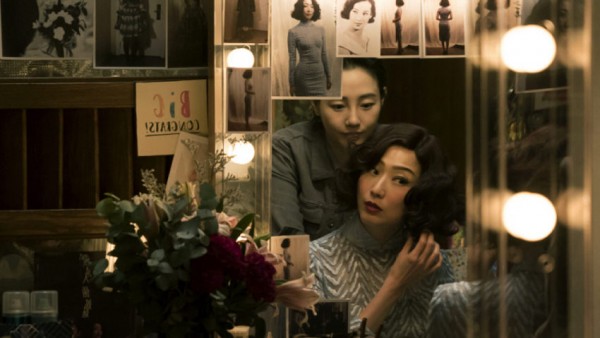
Unusually detailed IMDb summary HERE.
Audiences looking for the next “Crazy Rich Asians” might take some delight in Stanley Kwan’s diva-licious “First Night Nerves,” a “Feud”-like behind-the-scenes rivalry which forces center stage all the drama between high-maintenance Hong Kong actresses Yuan Xiuling (Sammi Cheng) and He Yuwen (Gigi Leung). Set during the final week of rehearsals for a new play called “Two Sisters,” the film feels soapier than a broken dishwasher, but that’s not necessarily a bad thing for audiences who relish the chance to watch actresses display their full range of emotion in a movie that gives even the smallest female parts more dimension than most movies offer their ostensible leading ladies.
One of Hong Kong’s only openly gay directors, Kwan has crafted a movie that’s nearly Almodóvarian in the appreciation and respect it showers upon ladies of all classes — not just the city’s Ferrari-driving super-elite, but also the loyal assistants who cook and console our dueling stars.
-Peter Debruge, Variety
People often say that the heyday of Hong Kong cinema is gone. The Hong Kong film here refers to films made in Cantonese language, through Hong Kong studios, directors, and subsided by Hong Kong capital. The directors and actors who led the Hong Kong film industry have headed to Hollywood or started their new journey in mainland China, not their home, after finishing their mission.
Stanley Kwan, who once was a symbol of Hong Kong cinema and who led Hong Kong’s New Wave movement, questions this common notion. He talks about a new way of making films that Hong Kongers can go to with his film First Night Nerves.
- Marie Lee, Asian Movie Pulse
First Night Nerves, 100 mins., debuted at Busan Oct. 2018; also shown at Singapore Dec. 2018. Now included in the San Francisco Film Festival.
SFFILM showtmes:
Thu, Apr 11 at 8:00 pm BAMPFA (EVENT HAS PASSED)
Sat, Apr 13 at 7:30 pm SFMOMA Phyllis Wattis Theater (EVENT HAS PASSED)
Fri, Apr 19 at 1:00 pm YBCA - AT RUSH!
Last edited by Chris Knipp; 04-15-2019 at 07:16 AM.
-
HARVESTERS, THE/DIE STROPERS (Etienne Kallos 2018)
ETIENNE KALLOS: THE HARVESTERS/DIE STROPERS (2018)
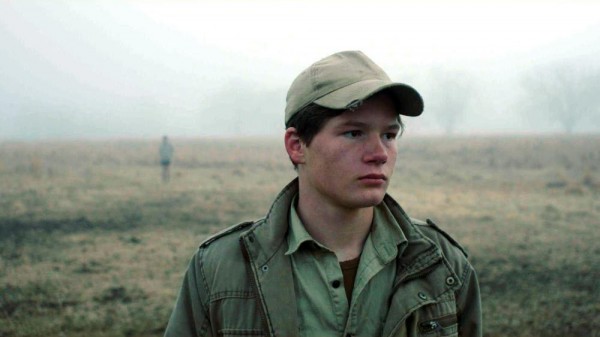
ALEX VERMEULEN IN THE HARVESTERS
[PREVIEW ONLY]
A brooding Afrikans debut
South Africa, Free State region, isolated stronghold to the dwindling Afrikaans white ethnic minority culture. In this conservative farming territory obsessed with strength and masculinity, Janno is different, secretive, emotionally frail. One day his mother, fiercely religious like the whole family, brings home Pieter, a hardened street orphan she wants to save, and asks Janno to make this stranger into his brother. The two boys start a fight for power, heritage and parental love. The film got a standing ovation at its debut in Un Certain Regard at Cannes. In the lead as Janno, beefy and rugby-playing but soft-faced youth Alex Vermeulen is a feat of perfect casting, and as his sudden opponent Pieter, Alex van Dyk isn't far behind. The Greek-descent director, who grew up in the Free State, and has won awards for shorts, returned home for this moody debut with its unique grand, harsh landscape and minimal music. This strange world reminded me of Carlos Reygadas' Silent Light (NYFF 2007). For some background see here; for aVariety review by Guy Lodge, here.
SFFILM showtimes:
Sat, Apr 20 at 6:30 pm Roxie Theater
Sun, Apr 21 at 3:45 pm Roxie Theatre

ALEX VAN DYK AND ALEX VERMEULEN IN THE HARVESTERS
Last edited by Chris Knipp; 04-12-2019 at 03:46 PM.
-
HONEYLAND/ Медена Земја (Tamara Kotevsk, Ljubomir Stefanov 2018)
TAMARA KOTEVSK, LJUBOMIR STEFANOV: HONEYLAND/ Медена Земја (2018)
Review originally published for New Directors/New Films (Apr. 3 & 5)
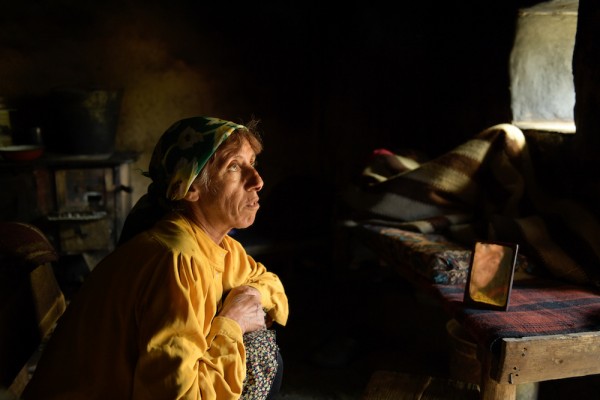
HATIDZE MURATOVA IN HONEYLAND
No matter how remote, your environment is in danger
Austere but rich, Kotevsk and Stefanov's Honeyland is one of the most immersive and atmospheric documentaries you will see this year. No narration is necessary. This film has only the limitation of its restrictive life. At the center of it, living in an abandoned Macedonian village, is Hatidze or Atidze Muratova, a small, tough birdlike woman of 55 with an easy smile, lined face, and big crooked teeth who tends her bee colonies with expertise and respect and her mother, with whom she lives, out of love and duty. Her mother Nazife is 85, not planning on dying, "just making your life misery," she says, declaring she's become a tree. She is half blind and does not stretch or go outside.
Hatidze is busy. What she does is wild beekeeping, or bee hunting, in hives she finds behind slabs of stone. Her easy skill with bees is clear, her respect for the sustainability of her task. She removes the combs like books from a shelf, easily, gently. She is cooperative, non-invasive. Look how she is with her skinny graceful dog at the very end of the film. She has a knack for nature that's almost elegant. She is good also with people, trading fairly and confidently to shopkeepers in the market in the capital, Skopje, touting the healthy and medicinal quality of her honey. Hatidze is a good person.
What a bare life this is. Comforts are dye for Hatidze's hair, tying it up with a nice scarf with rocky village chic, favoring yellow and green, a fan for her mother, and a little transistor radio hooked up once to a small speaker atop a pole she tries to broadcast music, but she gets only snatches of a song here or there. Herself, she sings. She cries and calls and sings to the bees when when she is working them.
The film is the result of three years of shooting by this team. As will happen with diligent documentarians, the reward of a significant event arrives: new neighbors appear with a dinky, antique trailer, seven unruly kids, and a bunch of calves. The man, Hussein Sam, takes up bee keeping too, but despite Hatidze's advice, never learns the way of it, or will not, because he is greedy for instant rewards and has not the necessary patience and respect that nature requires. We learn from Hatidze that you take half the honey and leave the other half to the bees. This maintains the balance. Take too much, and the bees will die, or attack Hatidze's bees. Sam takes too much, and both things happen.
One of the boys bonds with Hatidze. He understand them and respects her way with them. "If I had had a son like you. . . " she says. But his family doesn't understand the balance. But the neighbors are a nightmare. They are lazy and quarrelsome and the do serious damage. Their rampages cause the destruction of a lot of Hatidze's bees, their own, and, finally many of their young calves die due to the fat wife's carelessness. All goes wrong, angering even Hatidze's quiet mother. "May God burn their livers" is one of her last declarations. And then, after all their damage, they pick up and leave. Perhaps nature will regain its equilibrium again somehow. At the end, Hatidze's seen looking forward, alone, hopeful, strong.
This simple film is nonetheless superb and hard to improve upon. Kudos to the cinematography of Fejmi Daut and Samir Ljuma with its naturally gorgeous compositions of rocky hillside, animals, and ruined village architecture, the deep color of the clothes and gnarly skin in the market, the clear natural light. Much respect also to the filmmakers Tamara Kotevsk and Ljubomir Stefanov for their personal human sense of the observational documentary style, which makes this film so memorable.
Honeyland, 85 mins., debuted at Sundance (reviewed there by Guy Lodge for Variety and by Shiri Linden for Hollywood Reporter). Reviewed for New Directors/New Films, now showing in the San Francisco Film Festival.
SFFILM showtimes:
Sat, Apr 20 at 1:30 pm - BAMPFA- AT RUSH!
Fri, Apr 19 at 6:00 pm Victoria Theatre - AT RUSH!
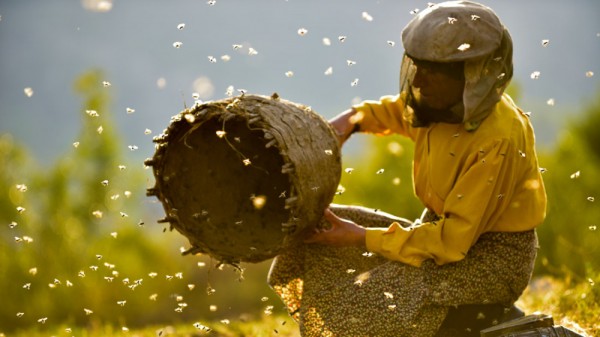
HATIDZE MURATOVA IN HONEYLAND
Last edited by Chris Knipp; 04-12-2019 at 05:43 PM.
-
IN MY ROOM (Ulrich Köhler 2018)
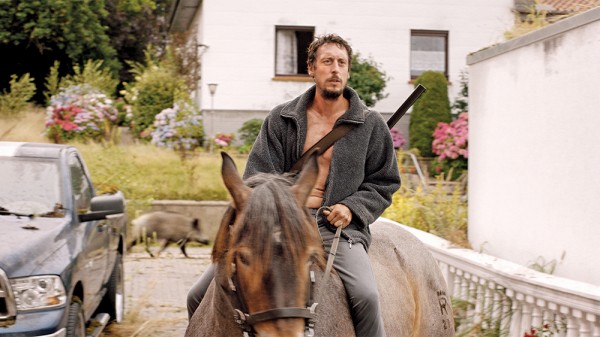
HANS LÖW IN IN MY ROOM
Muddling toward heroism
While I had trouble getting a grip on Köhler's previous film, the 2011 Sleeping Sickness (NYFF), this everyman-in-the-apocalypse tale, inspired, the director says, by three books,* goes down very easy, strange though it is. And after all, you want a last-man-living tale to be strange; otherwise why bother to make another one? We're with the Berlin School here, and Köhler's wife is Maren Ade, whose Toni Erdmann was one of the School's films recently celebrated at Cannes, as was this, and Valeska Grisebach's Western. These have all been included in NYFF's, by the way.
What's fresh here to start off with in the first of three segments, the slouchy protagonist, Armin (Hans Löw), doesn't do things that are going to seem meaningful or ironic when he wakes up and there's no living other soul on earth to be found. He's a tall, slightly slobby boychild, approaching middle age but a flop as a freelance TV cameraman covering local politics. He's so bad, the wittily absurd opening segment is a lengthy clip of jerky footage where he was confusing the "on" and "off" buttons of his telecamera and would up turning it off when the politicians gave their speeches and on when nothing was happening. He seems to make the dance club scene and he fails miserably to stage a one night stand with a lady his age. No wonder: he's a slob.
Armin takes a break (an autobiographical moment, Köhler has said) in the country helping his father take care of his dying, bedridden grandmother. Köhler delivers an almost alarming degree of banality-plus-specificity throughout all segment. It also goes on a tad too long by the standards of setups for conventional sci-fi apocalypse tales. This heightens our sense of the banality, and the suspense (assuming we know the genre we're watching).
Then comes the middle section, with its stunning leap. After Armin wakes up and can't find anybody alive, he flails aroudnd for a while, exploring empty shops, breaking into grandma's house. Her corpse is there and he finds a radical solution to that. He gets drunk. Most notably, he has an inspiration and a solitary moment of grand wildness. He steals a Lamborghini painted with racing insignias and drives at breakneck speed through all the winding streets of the town dodging scattered cars. Here production designers Jochen Dehn and Silke Fische excel, providing a wealth of motorcycles on highways scattered like dead beetles, big trucks diagonally abandoned, all sorts of signs of sudden disappearance of humanity.
The film gets a shot of adrenaline with its little sudden jump forward to Robinson Crusoe Armin, pot belly gone, tan and buff and flat-bellied, out at a farm he has set up in what he later explains is the area where he grew up, with livestock, chickens and a horse and at work on setting up a hydroelectric generator on a local stream, though somewhat inexplicably, there seems to still be water and light freely available from the usual public supply. Now, Armin not only looks good. He has a purpose in life, and seems happy. Just as Köhler reveled in his protagonist's humdrum urban quotidian, he now delights in the classic gestures of self sufficiency in nature. And this is obviously a choice. Armin could have survived on the edge of leftover civilization, off the abundance of consumable products, off canned food. But no. He will dig up potatoes, raise hens, shoot game.
In the last segment, Kirsi (carefully chosen Italian actress Elena Radonicich) appears, driving a small camper. Though Armin still has a car, he seems to prefer cultivation and travel via his trusty workhorse. She's attractive. And now, Armin is attractive too, both in his physical looks and in the machismo of his functionality in this new world. So here they are, Adam and Eve, and they look good. But of course it doesn't turn out that way. Köhler has said he chose Radonicich because she seemed like a woman who has lived alone independently for five years. They have sex, plenty of it. But when Armin suggests they make a baby, Kirsi balks. "Would you want to bring a child into this world?" she asks. "I love this world," he answers (a wonderfully resonant line, richer than it looks in print). "You don't," Kirsi says, "you just love fucking!" So gradually ends the idyll.
The New York Film Festival blurb last fall spoke of this film's "meticulous details and sly, subtle ironies," and its the interplay between the two that makes this a fresh and resonant work. It's also essential somehow that most of these Berlin School films tend to go on "too long." They create their own real time pace, as was notably the case with Maren Ade's Toni Erdmann. I have the feeling that I missed the point of Sleeping Sickness, an essence the judges got at Berlin that year to award it the Silver Bear. Here, I'm pretty sure rewatching would yield plenty of awards. The main actors are very interesting.
__________
*He has cited Arno Schmidt's Black Mirror, Marlen Haushofer's The Wall, and David Markson's Wittgenstein's Mistress as inspirations.
In My Room, 119 mins., debuted at Cannes Film Festival (Un Certain Regard) 17 May 2018, and showed in at least a dozen other festivals including Karlovy Vary, Munich, Jerusalem, New York, Busan, Göteborg, Rotterdam, and San Francisco, as part of which it was screened for this review.
SFFILM showtimes:
Sat, Apr 13 at 8:15 pm BAMPFA
Sun, Apr 14 at 8:00 pm SFMOMA Wattis Theater
Last edited by Chris Knipp; 03-22-2023 at 02:00 PM.
-
THE LOAD/TERET (Ognjen Glavonić 2018)
OGNJEN GLAVONIĆ: THE LOAD/TERET (2018)
(Originally published for New Directors/New Films)
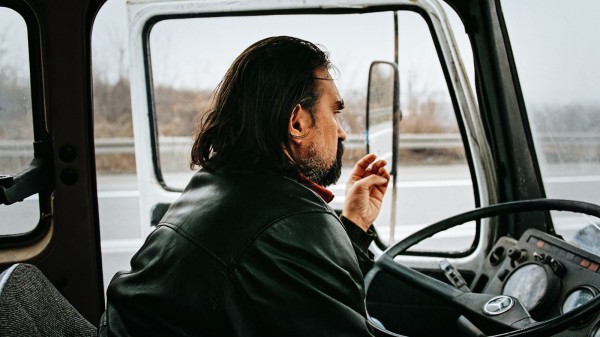
LEON LUČEV IN THE LOAD/TERET
A Serbian trucker's grim ride: a stoical look at an ambiguous journey
This atmospheric, wintry road movie by Ognjen Glavonić concentrates on a truck driver who must convey sensitive cargo along a treacherous path, from Kosovo to Belgrade during the 1999 NATO bombing of Yugoslavia. Reference to Henri-Georges Clouzot’s classic Wages of Fear of Friedkin’s remake Sorcerer is obvious but so is the difference: this driver has an unknown load, and papers permitting him to pass without opening it up to authorities. This is not a high tension journey with deliciously unbearable suspense, but rather one of slow, brooding, tedious nerve-wracking-ness and the growing sense that Vlada (Croatian actor Leon Lučev), the driver, has gotten involved in some unspecified but considerable evil. The oblique but insistent reference is to an atrocity, a late Kosovo war massacre, that Glavonić meticulously documented earlier in his 2016 non fiction film, Depth Two. Ognjen Glavonić is a person in intense pursuit of secrets his countrymen want to forget.The director has said "every country is built on crimes that they don’t want to talk about." The load: the very burden Vlado carries is weighted down with metaphorical conceit that, despite the minimalism of the style, feels lugubrious and heavy-handed.
On the journey not much happens but each small incident is magnified. Vlada picks up a young hitchhiker (Pavle Čemerikić) on his way to Munich. He stops to rest several times. He telephones to his wife, who's having hospital tests. He gets his cigarettes and what turns out to be a historic lighter stolen during a brief absence from the truck. The camera briefly leaves Vlada, following the hitchhiker to an abandoned playground where his name is painted (a goodbye to his youth, perhaps?) watched two young petty thieves examine the stolen lighter.
At the end of the film, Vlada meets with his son, Ivan, and tells him a wartime grandfather Leka cigarette lighter story that's less colorful, but may remind you of the gold watch story told by Captain Koons (Chris Walken) in Pulp Fiction. In a Film Comment interview with Eric Hynes, Glavonić says everything must lead up to the father's opening up to his son in this sequence. A nice touch, the walnut tree that grew out of the fallen Leka's pocket. There was actually a medal, a watch and a lighter awarded posthumously to Leka after WWII.
The ending is hopeful, with the teenage Ivan liking his dad's "friend's" band tape and sharing with his sister the thought that he needs to form a band of his own. But he won't escape the burden of these days he doesn't yet know about - not if Ognjen Glavonić has anything to say about it.
The Load/Teret 98 mins., debuted at Cannes in Directors Fortnight May 2018; over 1 5 other festivals including Toronto, Vancouver and Rotterdam. Reviewed at Cannes by Jessica Kiang for Variety (she calls this feature debut "harshly intelligent and uncompromisingly spare"), and by Stephen Dalton for Hollywood Reporter. Dalton comments pointedly that this film "should find a keen audience among the the misery-porn masochists who program and attend film festivals," but will be only "very niche commercial prospect, especially for non-Balkan viewers." A pessimistic view of a well-crafted film in which, indeed, not enough finally happens. Screened for this review as part of the 2019 MoMA-FSLC New Directors/New Films Series.
Now showing as part of the 2019 San Francisco Film Festival.
SFFILM showtimes:
Thu, Apr 18 at 6:00 pm - Roxie Theater
Sun, Apr 21 at 6:00 pm - BAMPFA
Mon, Apr 22 at 3:30 pm - Victoria Theatre
Last edited by Chris Knipp; 04-15-2019 at 07:21 AM.
 Posting Permissions
Posting Permissions
- You may not post new threads
- You may not post replies
- You may not post attachments
- You may not edit your posts
-
Forum Rules





 Reply With Quote
Reply With Quote








Bookmarks